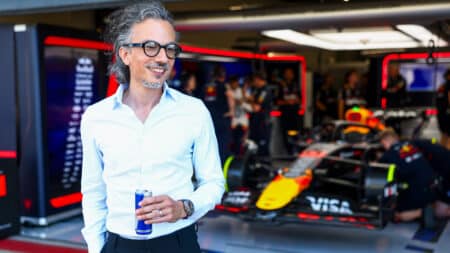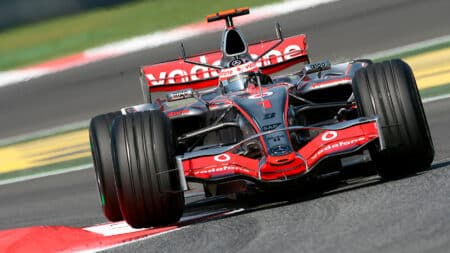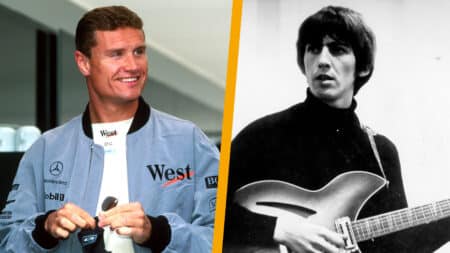
MPH: To the man trying to fill Christian Horner's shoes: good luck!
Laurent Mekies arrives as Red Bull F1 team principal with a series of immediate challenges to solve and long-term issues to tackle. He'll either sink or swim, says Mark Hughes
In Motor Sport this month, Grand Prix editor Mark Hughes addresses the ‘big questions’ we’ve posed ahead of the Formula 1 season, gathering all his information from the recent Spanish tests to offer a reasoned analysis beyond anything you’ll read elsewhere.
Does he have all the answers? Of course not. That’s the joy of the F1 pre-season. But from the daunting strength of Mercedes to the hopes of rebirth at Ferrari, the potential at Williams and Red Bull to the intrigue of what’s happening at McLaren, Mark has sifted through the major themes to conclude that little is as clear-cut and defined as it might seem from bare stats. Quelle surprise!

In the past few days, the story has taken its first major twist before anyone has even checked in for Melbourne flights, with the news that Fernando Alonso will not make the grid in Australia. The concussion he received in his Barcelona testing crash might have left him “asymptomatic of any medical issue”, as McLaren’s press statement so tortuously put it (bless ’em), but putting him at risk of another bang on the head has quite sensibly led to reserve Kevin Magnussen stepping back up to the race team from which he’d just been dropped.
The news broke as I pulled up at the BRDC clubhouse on Tuesday, to meet new Silverstone managing director Patrick Allen for the first time on a bright and sunny spring morning. As in F1, little remains the same for very long at Britain’s most prominent race circuit. During the course of our meeting, a snow blizzard would sweep across the circuit, then disappear in minutes as if we’d only imagined it. Typical Silverstone. The weather is as much a part of its character as the financial and political crises that blow in and out every once in a while.
Allen has been in the chair since January 1, although his involvement dates back to last September when the then-joint chief executive Lawrence Tomlinson (he of Ginetta) drafted his friend in to help with the latest drama. Silverstone, it emerged, was in something of a mess.

“There’s certainly plenty to do,” says Allen as we look out over Brooklands corner. “I think the circuit has been subject to a big sale distraction. The circuit was for sale, the deal fell over, there was another one – it’s been well documented. Then there was the management buy-out that ultimately didn’t happen. I don’t care what business you are in, when that process has happened on numerous occasions, the business suffers because no one is actually focused on running things. That distraction was detrimental to the operation.”
Allen’s background is in retail, and as a former executive director of marketing at the Co-Operative Group his experience stretches to a level far beyond a mere motor racing circuit. He’s moved quickly to implement significant change at Silverstone – happily, to the benefit of fans – and earned early kudos by making sure the circuit was in position to step in when the British MotoGP unexpectedly came back up for grabs this year.
“We had to make some swift decisions based on commercial realities,” he says, alluding to redundancies and a new team structure that is now in place. “But more importantly we had to put the customer back at the heart of the business. The new ticket pricing model has been supported by the public, and if they continue to support it that’ll generate the money to invest back into the circuit, to create a better environment for the customers, who will then come more often – and that helps generate profits.”

Back in December at the BRDC awards lunch, I was somewhat surprised to hear club president Derek Warwick call directly on Bernie Ecclestone for “help”, to safeguard Silverstone’s future as the home of the British Grand Prix. We all know the financial structure of running an F1 race is beyond anything that might be considered fair, but the circuit is only a few years into its 17-year contract with Formula One Management. Why renew such pleas now?
Less than four months on, Allen presents a very different message.
“Let’s stop just thinking about the Grand Prix and how we can afford it,” he says, admitting that the race does at least turn a profit. “We can afford it. We’d like to make more money out of it and we can do that with smarter negotiation with suppliers. But equally we have to ask ourselves how we use the Grand Prix ‘halo’ to drive people to our track-day experiences, to our conferences and banqueting business [at The Wing] and our other promoted events such as the World Endurance Championship and MotoGP.”
So how’s he found dealing with Bernie Ecclestone so far? Allen smiles. “I’ve yet to meet Mr Ecclestone,” he says. “We’ve had a telephone conversation and he was very affable, quite jocular with me. So I’m hoping that’s a good sign and hopefully can get a date in his diary in the next couple of weeks.

“Having a home Grand Prix is important to the calendar and if we can work with FOM to make it even better, then that is what we want to do. But going to ask for a better deal all the time is again a distraction. A contract is a contract and we’ve signed it. That’s what it is. Would we have liked it to be better? With hindsight, probably yes. But I can’t continually sit here and say ‘woe is me, we’re on the wrong end of a contract’.
F1 season preview by Mark Hughes
Lunch with Bobby Rahal by Simon Taylor
Gordon Coppuck profile by Rob Widdows
Carlos Sainz interview by Anthony Peacock
Bradley Smith interview by Ed Foster
Lella Lombardi profile by Paul Fearnley
Kevin Wheatcroft interview by Damien Smith
“Let’s get on and make the whole business work, get people into the arena, make it affordable for them, live off the back of the Grand Prix to generate other revenue streams and that way the whole business functions.
“Clearly if it becomes too onerous on the business then commercial reality says you have to look at the Grand Prix. But running cap-in-hand to Mr Ecclestone is not the way I work.”
His attitude to fans bodes well for a circuit that is better than it used to be, but still falls a long way short of world-class beyond the catch-fencing and the megalithic pit and paddock. He relates his first attempt to make the Grand Prix more affordable for the masses.
“A cost of more than £1000 for a family of four doesn’t make much sense,” he says. “I decided a ticket price of about £99 was where we needed to be. Certain members of the BRDC thought I’d taken leave of my senses. But we put 1000 tickets on sale, advertising it on a Monday and selling them on the Wednesday. In 22 minutes they were gone. So we left the offer open until 5pm that day and in all 6000 tickets were sold, most of which were general admission.
“Then 36 per cent of those subsequently upgraded to a £155 ticket for the Farm Curve grandstand. I was told ‘we can’t do that because those tickets are normally £230’. OK, so how many of those do we sell? The answer was ‘none’. That was the kind of nonsense we had to work with. Now 80 per cent of the Farm Curve grandstands are sold.”
Sales are up, aided by initiatives such as children under 10 being given free general admission, and Silverstone looks certain to be fit to burst come July 5. Also, with the improved traffic management of recent years, Allen doesn’t believe in capacity limits, so crowd records might well be broken in the years to come.
The place continues to split opinion among fans, but in terms of atmosphere and organisation the British GP is already one of the best races on the calendar – whatever Ecclestone might say about the delights of Mr Putin’s Sochi shindig. Now, under the new management, it might be about to get better still.
A few months ago, I voiced my scepticism about the benefits of the BRDC taking back hands-on control of operations at Silverstone. Past turbulence within the club over so many years makes it way too early to banish those doubts completely. But in its new boss, Silverstone might just have the right man to lead the old circuit into sunnier days.

Laurent Mekies arrives as Red Bull F1 team principal with a series of immediate challenges to solve and long-term issues to tackle. He'll either sink or swim, says Mark Hughes

Former McLaren F1 team-mates Mika Häkkinen and David Coulthard are set to renew old rivalries in a new Evening with... tour – they told James Elson all about it

In Formula 1, driver contracts may look iron-clad on paper, but history shows that some of its biggest stars have made dramatic early exits

Former McLaren F1 ace told James Elson about his private audience with The Beatles' George Harrison, who played an unreleased grand prix-themed song